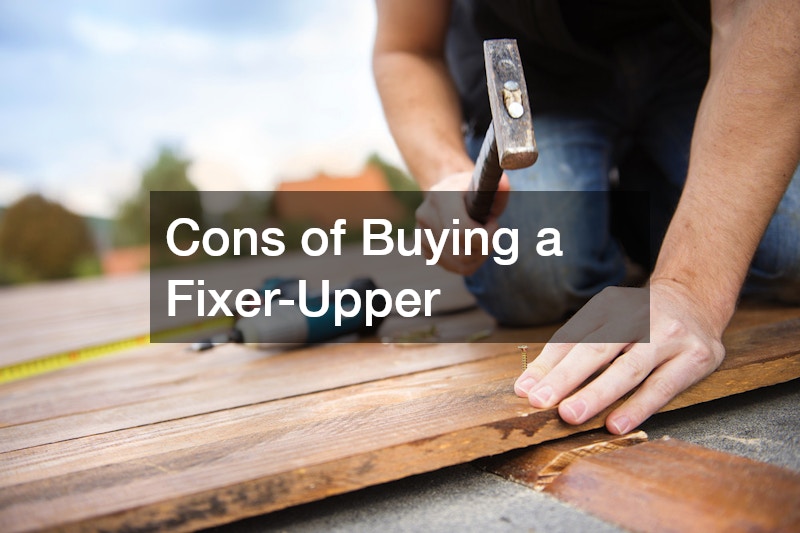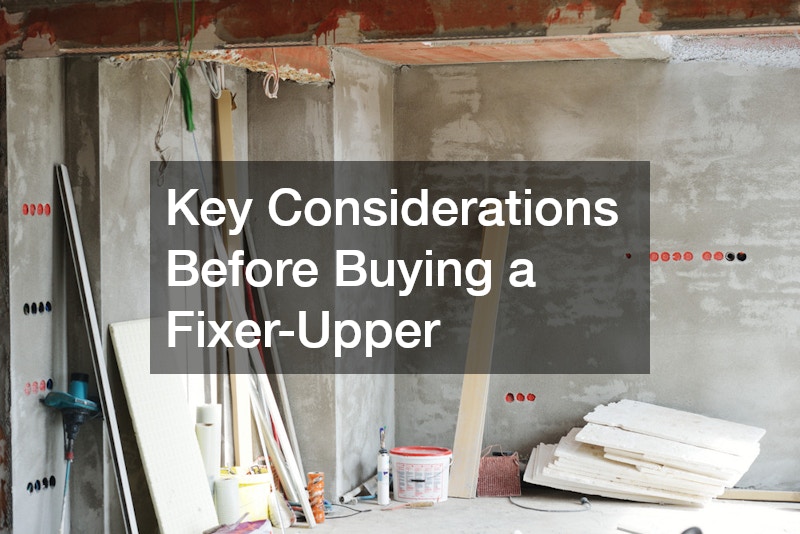Buying a fixer-upper can be an exciting and cost-effective way for first-time buyers to enter the housing market. These properties often come with lower price tags and the potential to customize your home to fit your vision. However, purchasing a fixer-upper also comes with challenges, including unexpected repairs, time-intensive renovations, and the need to hire trusted professionals such as roofing contractors, electricians, and local HVAC companies.
This decision isn’t just about budget—it’s about understanding what you’re willing to invest in terms of time, money, and effort. A fixer-upper can be a great opportunity to build equity and create your dream home, but it requires careful planning and preparation.
In this article, we’ll explore the pros and cons of buying a fixer-upper, key considerations before purchasing, and tips for managing renovations. By the end, you’ll have the tools to decide if a fixer-upper is the right choice for you.
1. Pros of Buying a Fixer-Upper

Buying a fixer-upper can be an appealing choice for first-time homebuyers looking for affordability, customization opportunities, and potential profits. While these homes require significant effort, they offer unique advantages that can make the investment worthwhile.
Affordable Entry into the Market
Fixer-uppers are typically priced lower than move-in-ready homes, making them an attractive option for buyers on a budget. By purchasing a home that needs work, you can secure a property in a desirable neighborhood that might otherwise be out of reach. With the help of a local contractor, you can tackle necessary repairs and upgrades over time, spreading out costs.
Customization Opportunities
Fixer-uppers allow you to create a home tailored to your preferences. From reconfiguring layouts to adding personal touches, the possibilities are endless. Working with a local custom home builder, you can design spaces that reflect your style, such as modern kitchens, open floor plans, or upgraded bathrooms.
Potential for Profit
Renovating key areas like the basement or roof can significantly increase the property’s value. A basement renovation can transform an underutilized area into a functional living space, while improving the HVAC system with a local HVAC company can attract future buyers. Strategic upgrades often lead to substantial returns on investment.
For first-time buyers willing to put in the effort, a fixer-upper offers an affordable and customizable way to enter the housing market while building equity.
2. Cons of Buying a Fixer-Upper

While buying a fixer-upper has its perks, it also comes with challenges that can be overwhelming, especially for first-time buyers. Before jumping into such a project, it’s important to understand the potential downsides.
Unexpected Costs
One of the biggest risks of buying a fixer-upper is the possibility of unforeseen expenses. Structural problems, plumbing issues, or electrical hazards may only become apparent after you’ve closed the deal. Repairs such as roof damage might require professional roofing contractors, while hidden leaks or outdated systems could call for plumbing services or a local HVAC company. These unexpected costs can quickly exceed your renovation budget.
Time-Consuming Renovations
Renovating a fixer-upper takes time, often longer than anticipated. Managing multiple projects like basement renovation or fence repairs can disrupt your daily routine. Coordinating work with a fence repair company, local contractor, or roofing experts requires constant attention and scheduling. For buyers on a tight timeline, these delays can be frustrating.
Stress and Uncertainty
Renovations can be unpredictable. Hidden issues such as mold, asbestos, or faulty wiring may arise, causing project delays and added expenses. Without prior experience or a reliable team of professionals, such as electricians or custom builders, the process can feel overwhelming and stressful.
Before buying a fixer-upper, ensure you’re prepared for the time, money, and effort required. Weighing these cons against the potential benefits is key to making an informed decision.
3. Key Considerations Before Buying a Fixer-Upper

Purchasing a fixer-upper can be a rewarding investment, but it’s crucial to evaluate the property carefully to avoid costly mistakes. First-time buyers should prioritize proper inspections, budgeting, and assessing their capacity to manage renovations.
Assess the Home’s Condition
Start by hiring professionals to conduct a thorough inspection of the property. Roofing contractors can identify issues like leaks or structural damage, while electricians can assess the state of the home’s wiring. A local HVAC company can ensure that heating and cooling systems are functional, and plumbing services can evaluate pipes for leaks or clogs. Understanding the extent of necessary repairs is essential before making an offer.
Set a Realistic Budget
Factor in the cost of renovations, including essentials like a basement renovation, roof repairs, or HVAC upgrades. Be sure to include contingency funds for unexpected issues, such as water damage or outdated electrical systems. Collaborating with a local contractor can help you estimate costs and prioritize projects.
Evaluate Your Skills and Time
If you’re considering tackling some work yourself, ensure you have the skills and tools to handle the projects. For more complex tasks like structural repairs or roofing, it’s best to hire professionals. Managing renovations also requires significant time, so consider whether your schedule allows for overseeing projects.
By addressing these considerations, you can confidently determine if a fixer-upper aligns with your goals and resources. Proper preparation sets the foundation for a successful investment.
4. Tips for Renovating a Fixer-Upper
Successfully renovating a fixer-upper requires careful planning, prioritization, and collaboration with skilled professionals. To transform a fixer-upper into your dream home, follow these essential tips.
Prioritize Structural and Essential Repairs
Before diving into cosmetic updates, focus on critical structural issues to ensure your home is safe and functional. Start with the roof—hire roofing contractors to inspect and repair leaks or damaged areas. Address any HVAC concerns by working with a local HVAC company to service or upgrade your heating and cooling systems. Plumbing issues should also be resolved early on; plumbing services can repair leaks, clear clogs, and replace outdated pipes. Don’t forget essential drain cleaning to prevent blockages and ensure proper water flow. These foundational repairs prevent further damage and lay the groundwork for subsequent improvements.
Focus on High-Value Projects
Maximize your return on investment by tackling renovations that add significant value to your home. A basement renovation can transform an underutilized space into a functional area such as a guest suite, home office, or entertainment room. Similarly, upgrading kitchens and bathrooms is a proven way to increase property value. If your home’s exterior needs attention, partner with a fence repair company to boost curb appeal and define your outdoor space.
Work with Trusted Professionals
Fixer-uppers often involve multiple contractors. Research and hire reputable roofing contractors, local contractors, and other specialists to ensure quality work. Getting multiple quotes helps you stay within budget while receiving fair pricing. For complex projects like electrical upgrades, hire experienced electricians who can handle the work safely and efficiently.
Plan Your Timeline Wisely
Renovations can be time-consuming, so develop a clear timeline for each project. Break down tasks into manageable phases, starting with structural repairs and moving toward interior upgrades. Set realistic expectations for completion to avoid stress or delays.
By prioritizing essential repairs, focusing on high-value projects, and partnering with skilled professionals like a local HVAC company, plumbing services, and drain cleaning experts, you can successfully renovate your fixer-upper. Proper planning ensures the transformation of your property into a beautiful, functional home that meets your needs.
5. When to Avoid a Fixer-Upper
While fixer-uppers can offer great potential, they’re not always the best choice for every buyer. Certain circumstances, such as extensive damage, tight timelines, or lack of experience, may make a fixer-upper more trouble than it’s worth. Knowing when to avoid such properties is essential for first-time buyers to avoid financial and emotional strain.
Significant Structural Issues
If the home has major structural problems, it may not be worth the investment. Severe roof damage requiring full replacement or large-scale repairs can be expensive, even with the help of reliable roofing contractors. Foundation cracks, sagging floors, or deteriorating walls can add substantial costs to your renovation budget. Homes with outdated systems may also require extensive plumbing services, electrical rewiring by experienced electricians, or HVAC upgrades by a local HVAC company, which can quickly push the property beyond your financial capacity.
Tight Deadlines or Limited Funds
Fixer-uppers demand time and resources. If you need to move in quickly or lack the budget to cover unforeseen repairs, a fixer-upper may not be the best fit. Renovations like basement renovation, fence repair, or HVAC overhauls can take months, especially when coordinating with a fence repair company, roofing contractors, or a local contractor. Rushed renovations may lead to incomplete work, subpar results, or higher expenses.
Lack of Experience or Support
First-time buyers with little experience in home renovations may find the process overwhelming. Without knowledge of hiring reputable contractors or managing projects, dealing with issues like plumbing or electrical upgrades can become stressful. If you’re unsure of how to budget, manage timelines, or choose the right professionals, it may be wise to avoid a fixer-upper.
Excessive Hidden Costs
Homes with hidden problems, such as water damage, mold, or faulty systems, often require specialized services like plumbing services, mold remediation, or structural repairs. These costs can escalate rapidly, exceeding the property’s value and eroding your investment.
In situations involving extensive repairs, tight resources, or lack of expertise, it’s best to avoid a fixer-upper. Focus instead on properties that better match your financial and personal readiness, ensuring a smoother transition into homeownership.
6. Alternative Options for First-Time Buyers
While fixer-uppers can be rewarding, they aren’t always the best choice, especially for first-time buyers. If the challenges of renovations seem overwhelming or unsuitable for your current situation, consider these alternative options that balance affordability, convenience, and long-term value.
Move-In-Ready Homes
Move-in-ready homes are ideal for buyers who want minimal hassle. These properties require little to no renovations, allowing you to settle in immediately. While they may cost more upfront compared to fixer-uppers, they save time and effort. Additionally, move-in-ready homes often include updated systems, reducing the need for immediate services like plumbing services, HVAC repairs, or work from electricians. For first-time buyers with tight schedules or limited renovation experience, this option provides peace of mind.
New Construction Homes
Working with a local custom home builder can offer a personalized and stress-free experience. New construction homes let you design a property tailored to your needs without dealing with outdated features or structural issues. They come with modern amenities, energy-efficient systems, and warranties, which reduce the likelihood of needing roofing contractors, plumbing services, or local HVAC companies for repairs soon after moving in. While the cost may be higher, the long-term benefits include reduced maintenance and a home built to your specifications.
Light Fixer-Uppers
If you’re drawn to the idea of adding personal touches to your home without taking on massive projects, consider light fixer-uppers. These properties may need simple upgrades like painting, new flooring, or cosmetic changes, rather than extensive renovations. A property requiring minor updates, such as fence repair by a fence repair company or landscaping enhancements, is manageable for first-time buyers with limited renovation experience. You can still add value and customize your home without tackling major repairs like roofing or plumbing overhauls.
Homes with Partial Renovations
Some properties fall between fixer-uppers and move-in-ready homes. These homes may have essential updates completed, such as a recent roofing services upgrade, but still offer opportunities for personalization. For instance, completing a basement renovation or upgrading lighting can add your unique style while avoiding overwhelming projects.
By exploring these alternatives, first-time buyers can find options that suit their financial situation, lifestyle, and renovation experience, ensuring a smoother and more enjoyable home-buying journey.
Conclusion: Deciding if a Fixer-Upper is Right for You
Purchasing a fixer-upper can be an exciting opportunity to create a home tailored to your needs while potentially saving money and building equity. However, it’s not without its challenges, such as unexpected costs, time-consuming renovations, and the need to work with trusted professionals like roofing contractors, electricians, and plumbing services. For first-time buyers, careful consideration of your budget, timeline, and renovation skills is crucial before committing to such a project.
If the challenges of a fixer-upper seem overwhelming, alternatives like move-in-ready homes, new construction with a local custom home builder, or light fixer-uppers may better suit your situation. These options offer varying levels of customization and effort, ensuring there’s a perfect fit for your needs and lifestyle.
Ultimately, choosing a fixer-upper or an alternative depends on your goals, resources, and willingness to take on the work. With proper planning and expert help, you can find a home that’s both rewarding and manageable.

